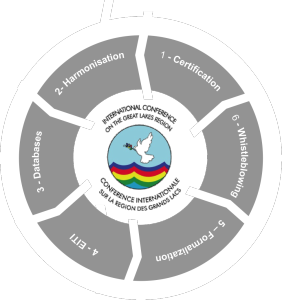Stream House has been assisting in the implementation of a whistleblowing mechanism within the context of the prevention of illegal exploitation of natural resources in the Democratic Republic of Congo (DRC) and Burundi which are member states of the International Conference on the Great Lakes Region (ICGLR). This region is plagued by the “paradox of plenty” – while being rich in many natural resources currently in high demand on the global market, such as tungsten, tantalum and tin or gold, the (illegal) exploitation of the mineral trade has contributed to human rights abuses, armed conflicts and ongoing insecurity, instead of contributing to sustainable, peaceful social and economic development.
In recent history, the prevalence of illegal, unregulated, and exploitative mining and trading practices had resulted in a vastly unequal distribution of the wealth derived from natural resources. Furthermore, this money had been financing unsanctioned armed groups and rebel activities. On an international level, there are various legal and other initiatives underway that seek to address the problems of conflict minerals, such as the Dodd-Franck Act, the EU Directive, or the EITI.
 The ICGLR has developed a comprehensive approach to eradicate predatory use of natural resources in the region. The Regional Initiative against the Illegal Exploitation of Natural Resources (RINR) aims at severing the link between mineral revenues and rebel financing. On December 15, 2006 the eleven Member States of the ICGLR signed the Protocol on the Fight against the Illegal Exploitation of Natural Resources. The Protocol provides the legal basis for the implementation of the RINR. The Lusaka Declaration, signed on December 15, 2010, specifies six complementary tools, which will comprise a regional control mechanism aimed at eradicating the main source of funding for violent conflict in the region. The six tools are: i) the creation of a regional certification mechanism for natural resource supply chains, ii) the harmonization of national legislation in member states, iii) the construction of a regional database on mineral flows, iv) the formalization of the artisanal mining sector, v) the promotion of the Extractive Industries Transparency Initiative (EITI) peer learning mechanism, and vi) the establishment of a whistle-blowing mechanism. Each of the tools are in different stages of implementation, given the fragile security situation along with social, political and bureaucratic challenges.
The ICGLR has developed a comprehensive approach to eradicate predatory use of natural resources in the region. The Regional Initiative against the Illegal Exploitation of Natural Resources (RINR) aims at severing the link between mineral revenues and rebel financing. On December 15, 2006 the eleven Member States of the ICGLR signed the Protocol on the Fight against the Illegal Exploitation of Natural Resources. The Protocol provides the legal basis for the implementation of the RINR. The Lusaka Declaration, signed on December 15, 2010, specifies six complementary tools, which will comprise a regional control mechanism aimed at eradicating the main source of funding for violent conflict in the region. The six tools are: i) the creation of a regional certification mechanism for natural resource supply chains, ii) the harmonization of national legislation in member states, iii) the construction of a regional database on mineral flows, iv) the formalization of the artisanal mining sector, v) the promotion of the Extractive Industries Transparency Initiative (EITI) peer learning mechanism, and vi) the establishment of a whistle-blowing mechanism. Each of the tools are in different stages of implementation, given the fragile security situation along with social, political and bureaucratic challenges.
Since 2012, based on a mandate from GIZ and the ICGLR, Stream House and its partners have developed a web and mobile-access whistleblowing system tool that addresses some of these challenges. The system is designed to be highly secure and protect the anonymity of the whistleblowers and confidentiality of reported data.
In addition, Stream House has conducted tailor-made training programs for enforcement and regulatory authorities from the region in investigating and prosecuting cases using whistleblower leads. Stream House has also designed a training and sensitisation program for local civil society organisations highlighting the legal framework addressing the illegal exploitation of natural resources, raising awareness, best practices and risks to be considered in the effective use of the mechanism.
